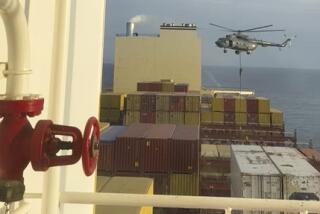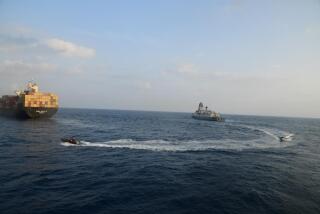Hijackers Seize Kuwait Jet, Threaten Emir’s Relatives
- Share via
CAIRO — Arab gunmen seeking the release of 17 convicted terrorists imprisoned in Kuwait hijacked a Kuwait Airways jumbo jet Tuesday and forced it to fly to Iran, where they threatened to kill several members of the Kuwaiti royal family who were among the 112 hostage passengers and crew members.
Early today, after a tense standoff between the hijackers and security forces blocking the runway, the official Iranian news agency IRNA reported that the hijackers had released 24 women passengers and crew members after negotiations with Deputy Prime Minister Alireza Moayeri.
Earlier, the terrorists released a Jordanian businessman with a heart ailment who told authorities that there were “five or six” hijackers aboard the plane, all armed with pistols and hand grenades.
In Kuwait, officials confirmed that three members of the royal family, all distant relatives of Kuwait’s emir, Sheik Jabbar al Ahmed al Sabah, were on board Flight KU 422. The Boeing 747 was hijacked several hours after taking off from Bangkok, Thailand, for Kuwait on Tuesday morning.
Airline officials said more than two-thirds of the passengers were foreigners, including 20 Britons and an American who was said to have dual U.S.-Egyptian citizenship.
The hijackers forced the plane to change course while it was over the Gulf of Oman and to fly to the northeastern Iranian city of Mashhad near the Soviet border, about 470 miles east of Tehran.
More than 12 hours after landing at Mashhad airport, where Iranian security forces sealed off the tarmac to prevent the plane from departing, the hijackers issued a statement demanding the release of 17 Shia Muslims jailed in Kuwait for various terrorist offenses, including truck-bomb attacks on the U.S. and French embassies in 1983.
“They (the hijackers) announced that a number of individuals related to Kuwait’s Sabah family are among the passengers and would be in imminent danger if the Kuwaiti government does not reply to their requests,” Tehran Radio reported.
The Iranian news agency IRNA added that the hijackers, who did not divulge their identities or say what group they belonged to, had asked Iran either to mediate on their behalf with Kuwait or to allow the plane to refuel and take off for another, as yet undisclosed, destination.
The agency said the hijackers threatened to blow the plane up if any attempt was made to storm it.
Emergency Session
In Kuwait, the government was called into emergency session, but it was not expected to agree to the hijackers’ demands, diplomatic sources and other officials said. Kuwait refused a similar demand in 1984, when terrorists commandeered another Kuwaiti airliner to Tehran and killed two American passengers before Iranian commandos stormed the plane and captured the hijackers.
Tehran Radio quoted Kuwait’s prime minister, Sheik Saad al Abdullah al Sabah, as saying that the Kuwaiti government “has not accepted this request in the past and does not accept it now either.”
An official Kuwaiti spokesman added that the government trusted Iran to “handle the situation wisely, in a manner that ensures the safety of the passengers, the crew and the plane.”
Officials in Kuwait identified the royal family members on board the plane as Fadhil Khaled al Sabah, his brother Anwar Khaled al Sabah and their sister Ibtisaam. The two brothers were said to be businessmen distantly related to Kuwait’s ruler, Sheik Jabbar.
The released Jordanian businessman, Mustafa Issa, 42, said several of the hijackers referred to “rights denied them by the Kuwaiti government” but otherwise revealed no information about themselves.
Believed to Be Shias
However, their demands for the release of the 17 convicted terrorists suggested that they were Shia Muslims, from Kuwait or elsewhere, affiliated with the terrorists held in Kuwaiti jails.
In Bangkok, airport officials were at a loss to explain how the armed hijackers got aboard the Kuwait Airways jet. Elias H. Shiber, the airline’s manager in Thailand, told reporters that security at Bangkok’s Don Muang Airport, where the flight originated, had been “excellent, 150%” since the airline began operating in Thailand in 1978.
Charoon Peethong, director of the Airport Authority of Thailand, said passengers boarding the plane had gone through normal security checks. Checked luggage and hand baggage was X-rayed and passengers were required to pass through a metal detecto he explained.
Charoon conceded, however, that the hijackers must have boarded at Bangkok. The plane arrived from Kuwait on Monday and was on the ground for 15 hours “under seal” by airline officials and Thai security personnel before taking off on its return flight, he said.
“We have been investigating to find any faults, and we won’t protect anyone. . . ,” Charoon told a Thai reporter.
A number of militant Shia groups in Iran and Lebanon, among them the Islamic Jihad (Islamic Holy War) terrorists who hold a number of Western hostages in Beirut, have sought the release of the 17 prisoners in Kuwait since 1984, the last time a Kuwaiti airliner was hijacked.
The 1983 embassy attacks, as well as an attempt to assassinate the Kuwaiti emir himself two years later, were blamed at the time on Al Daawa, an underground organization of Iraqi Shias supported by Iran, which has been at war with Iraq for more than seven years. The 17 prisoners are believed to be members of Al Daawa.
However, subsequent attempts to sabotage Kuwaiti oil installations and stage other terrorist attacks were blamed on other militant Shias from Kuwait itself.
Leaders Are Sunnis
About one-third of Kuwait’s population adheres to the Shia branch of Islam, while the leadership, like the elite in virtually every Arab country, is of the more orthodox Sunni sect. Communal tensions between the two groups have always been strong, and they have been exacerbated further by the Persian Gulf War between Sunni-ruled Iraq and Shia-run Iran.
Kuwait said Tuesday that it was in close contact with Iranian officials and had asked them to “take whatever measures are necessary” to prevent the hijacked aircraft from taking off from the Mashhad airport.
But coordination between the two sides was complicated by the tense relations between non-Arab Iran and Kuwait, stemming from the latter’s support for Iraq in the war.
Diplomatic relations have been almost non-existent since Iranian Revolutionary Guards seized and briefly occupied the Kuwaiti and Saudi embassies in Tehran last August. Last week, mounting tension led to an armed clash when Iranian speedboats opened fire on Kuwaiti military positions on Bubiyan Island at the northern end of the Persian Gulf.
Envoy From Tehran
However, Iranian Prime Minister Hussein Moussavi, who dispatched an envoy to Mashhad to negotiate with the hijackers, pledged over Tehran Radio to try “to resolve the incident peacefully to save the lives of the people on board.”
Iran, Moussavi added, condemned the hijacking as “an act that is against humanitarian and Islamic principles and unacceptable as a political tactic.”
Diplomatic sources in the gulf region said it was hard to gauge what impact, if any, these political overtones would have on Iran’s handling of the hijacking. They suggested that the presence of Kuwaiti royalty among the passengers could be an added complication.
Asians Returning Home
The other passengers included the 20 Britons, some of whom were believed to have been en route to London via a connecting flight in Kuwait, several other West Europeans and a number of Asian workers returning from home leave to their jobs in the gulf region. The identity of the passenger who reportedly carries both U.S. and Egyptian passports was not immediately known.
In Washington, the State Department condemned the hijacking and urged Iran to bring the terrorists to justice. Times staff writer Nick B. Williams Jr. contributed to this story from Bangkok, Thailand.
More to Read
Sign up for Essential California
The most important California stories and recommendations in your inbox every morning.
You may occasionally receive promotional content from the Los Angeles Times.










